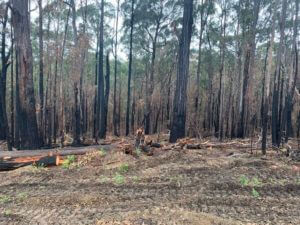
The peak Australian and Tasmanian forest products industry bodies have welcomed the Tasmanian Government’s significant investment in bushfire mitigation announced today, and the inclusion of mechanical fuel reduction in the state’s Fuel Reduction Program.
The Tasmanian Government 2020-21 Budget commits nearly $18 million in fire mitigation initiative, including a $9.3 million boost to its Fuel Reduction Program to provide increased strategic fuel reduction burning, including mechanical risk reduction.
The Chief Executive of the Tasmanian Forest Products Association (TFPA) Nick Steel also welcomed the increased funding for Tasmanian bushfire mitigation.
“The Government is showing it can see that reducing the hazards also reduces the risk of bushfires,” Mr Steel said.
“It’s bringing in extra firefighters for the season, both volunteer and full time, and dedicating a Deputy Chief Officer role to bushfire planning and hazard reduction. Very importantly it’s providing financial support to landowners so they can manage the fire risk on their properties.”
Chief Executive of the Australian Forest Products Association (AFPA) Ross Hampton welcomed the inclusion of mechanical fuel reduction, which the final report of the Royal Commission into Natural Disaster Arrangements handed down last week recognised as an important tool in fuel reduction.
“Mechanical Fuel Reduction has proven effective overseas as part of whole-of-landscape fire hazard reduction activities and can significantly reduce bushfire severity around communities and key infrastructure when deployed strategically in conjunction with controlled burns, but it remains under-utilised in Australia,” Mr Hampton said.
“I commend the Tasmanian Government for showing leadership on this issue and listening to the science, and I urge all states and territories to do the same.”
“The Black Summer Bushfires showed just how important hazard reduction is in preparing for fires, and the enormous economic, social and human cost when it isn’t done, or not done effectively,” Mr Hampton concluded.
The original media release is here:







